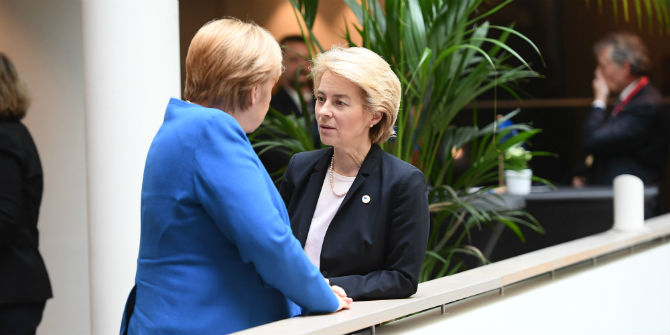The rise of anti-system politics reflects the exhaustion of neoliberal democracy, writes Jonathan Hopkin (LSE) in his new book ‘Anti-System Politics. The Crisis of Market Liberalism in Rich Democracies‘, which explains the rise of the xenophobic right and the anti-capitalist left as part of a common global trend.
The seismic events of 2016 – first Britain’s vote to leave the European Union, then Donald Trump’s election to the Presidency six months later – brought anti-system politics on to the front pages, but the pressure had been building for some time. The Greek Socialist Party (PASOK), after presiding over a catastrophic bailout and brutal austerity measures, was effectively wiped out in the 2012 election, its place taken by a radical left coalition, SYRIZA. In Spain, centrist Catalan nationalists pivoted to a radical policy of secession, whilst a powerful anti-austerity street movement directed millions of voters towards an entirely new political party, Podemos (‘We Can’). In Italy, a party of ecologists and digital democracy campaigners led by a comedian, the Five Stars Movement, became the biggest party in the 2013 election. In Britain, Labour Party members elected veteran left-winger Jeremy Corbyn as their new leader in 2015, soon after the pro-independence Scottish Nationalist Party had won all but three parliamentary seats in Scotland.
Unlike Trump or the Brexit campaign, none of these movements had adopted an anti-immigration or culturally conservative message, quite the contrary. Instead, their campaigns focused on the failure of the political establishment to represent popular demands for protection from the brutal effects of the economic crisis. The banking bailouts and the austerity measures that followed them sparked popular outrage whilst sharpening pre-existing political conflicts and discrediting incumbent political elites. Some of this outrage was channeled by right-wing anti-system politicians demanding tighter border controls and a reversal of globalization, but a good part of it went in a very different direction. Social movements demanding a more participatory form of democracy, an end to austerity and a reining in of the power of the wealthy elite – the ‘one per cent’ – were just as much part of the story as the radical anti-migrant right.
 This book explains the rise of the xenophobic right and the anti-capitalist left as part of a common global trend: anti-system politics. It explains why anti-system politics is on the march, and why different forms of anti-system politics prosper in different places and amongst different types of voters. Its basic premise is that the political and economic ‘system’ failed, and that anti-system movements are a predictable, and in many ways welcome, response to that failure. Dismissing angry opposition to the status quo as a result of racism, self-indulgence, or susceptibility to foreign propaganda is a serious mistake. What the anti-system left and right have in common is their shared rejection of the political and economic order governing the rich democracies at the beginning of the 21st century. This rejection is most powerful in the democracies where inequality is highest, and where the social and economic effects of the global financial crisis have been most severe.
This book explains the rise of the xenophobic right and the anti-capitalist left as part of a common global trend: anti-system politics. It explains why anti-system politics is on the march, and why different forms of anti-system politics prosper in different places and amongst different types of voters. Its basic premise is that the political and economic ‘system’ failed, and that anti-system movements are a predictable, and in many ways welcome, response to that failure. Dismissing angry opposition to the status quo as a result of racism, self-indulgence, or susceptibility to foreign propaganda is a serious mistake. What the anti-system left and right have in common is their shared rejection of the political and economic order governing the rich democracies at the beginning of the 21st century. This rejection is most powerful in the democracies where inequality is highest, and where the social and economic effects of the global financial crisis have been most severe.
Anti-system parties and politicians tend to present themselves self-consciously as alternatives to a discredited establishment or elite. They accuse the mainstream politicians of behaving like Adam Smith’s tradesmen, banding together in a ‘conspiracy against the public’ to close the market to new entrants and cheat their customers by offering them a restricted choice. Typically, the mainstream political parties are depicted as being indistinguishable from each other, their leaders a homogeneous collection of careerists devoid of principles (…).
But the failures of establishment politicians cannot be reduced solely to venality or laziness. The narrowing of the political space owed much to the serious difficulties politicians began to face, especially from the 1970s on, in meeting citizens’ demands. The slowing of economic growth meant that politicians had fewer resources to play with, whilst financial markets were becoming more difficult to control, limiting national governments’ ability to tax profits or borrow to fund public spending. The political ‘cartel’ of the late 20th century emerged as politicians became increasingly pessimistic about the possibility of government intervention in the economy to deliver social improvements, and settled instead for a more laissez-faire approach, hoping that freer markets and lower taxes would keep their voters happy.
(…)
The progressively broader role for markets in social life translated almost everywhere into higher inequality. Not only did markets tend to result in a more unequal allocation of resources, but the same neoliberal logic also undermined the kinds of non-market institutions that could mitigate these inequalities, such as progressive taxation and redistributive government spending. (…)
All of this may have been a price worth paying had the promise of improved economic growth and a ‘trickle down’ effect of higher earnings across the rest of the economy come to fruition. Neoliberalism achieved some successes – notably defeating inflation and eliminating some wasteful and inefficient government regulation and expenditure – but it was unable to match the economic record of the post-war period. The typical household still enjoyed rising living standards in most countries, but poverty rates also increased. Viewed from the mid-2000s, the neoliberal experiment had yielded at best mixed results, and then in 2007 the intricate architecture of the emerging global financial system, a system built upon the neoliberal philosophy of free markets and minimal government intervention, came crashing down, devastating lives across the world.
(…)
The crisis of the late 2000s contains all the basic ingredients for a political backlash: economic stagnation, high inequality, and a political system which blocked off any prospect of effective change. Across the democratic world, the share of the population benefitting from these economic and political arrangements has contracted to such an extent that the dominant political parties no longer have the votes to maintain themselves in office. The 40 year-long experiment in leaving people at the mercy of the market produced a top-heavy income distribution of a small number of big winners, a much larger group of losers, and a squeezed middle fighting to maintain its position in an increasingly insecure world. The political establishment had run out of ideas to make things better. The rise of anti-system politics reflects the exhaustion of neoliberal democracy: an economic model that ultimately only worked for a minority, and a political system that closed off alternatives to it.
This post represents the views of the author and not those of the Brexit blog, nor the LSE.







We’ve had social democracy working with and against so-called capitalism, but ‘capitalism’ was never about a free market for capitalists or the democracies. It was always a managed affair. Managed by the nation-states, nationally and internationally, and managed by the corporate world, nationally and internationally. Competition was limited in many parts of the economy, sometimes limited to the degree of an oligopoly, a monopoly or a cartel, sometimes de facto, but often de jure as well.
Social democracy has had its day, except in a few small European countries. Democracy has morphed into a fake majority rule without the usual civil rights historically associated with the European, western, democracies. The majority of the electorates vote for the established parties. The established parties are beholden to the now post-capitalist Establishment which is transnational and in control of the broader national body politics. Politics was at least half serious before and during the heyday of trade unionism. Now it is almost 100% psycho-political theatre.
The welfare state can be regarded as the main driver in the demise of democracy as the right form of (self-)government. Apart from the fact that people were conditioned by the Establishment to put their trust in the political system, the welfare state allowed people the luxury of letting their political common sense to go to sleep. The international Establishment has not been asleep, on the other hand. They have been hard at work gaining more power in every way. The salient aspects of the post-capitalist manoeuvres have been given various names. Neo-conservative, liberal, free market, neo-liberal, now neoliberal, and so it goes. The current situation holds a political lesson, a real life experiential lesson, for the suckers on the welfare statist teat. It will be some time before scholars not in the pay or otherwise beholden to the globalists analyse this development in the old West, where the welfare state was firmly established. The so-called anti-system politics is the beginning of the realisation that for the democratic nation-states and its citizenry the game is up.
The notion that neoliberalism is also past its use-by date is presented in such a way here as to give the impression it has failed somehow. It has not failed, quite the contrary. Neoliberalism was only ever a vehicle, a political strategy as part of the broader indoctrinating narrative. It has been superseded by something which has not been named yet, not officially anyway.
One could call the new post-neoliberal system globalism, the new world order or some such euphemism. The facts are better described with a combination of names, such as, unbridled kleptocratic post-capitalist globalised corporate enterprise, or words to that effect.
Progress happens due to a tension between opposing forces or energies. When one side weakens, the other gains the upper hand and regress is assured. Therefor, the anti-globalists may choose to decline to struggle against these now superior globalist forces. This, many of those opposed to the new one world government order will be unable to accept. They will join the false opposition in a strange and probably unprecedented tug of war for control of political powers, while the socially-inclined democrats, in the old West, will look on in horror wondering what to do, if anything.
Democracy, apparently, is something that is strictly rationed in the world. Efforts have been made to export it from the West to the rest. Although this has not been entirely a waste of time, much of it has been lost in transit, and very little or nothing of democracy has been replenished in the old West. The old West in this regard is Europe north and west of the mountain chain from Biarritz eastwards, Canada and Australasia. The US was never democratic in a European sense, so it has not had as much to lose in that regard. Japan, although reckoned to be a Western democracy, is really a modernist feudal society and likely to be least affected by this political change of heart in the West.